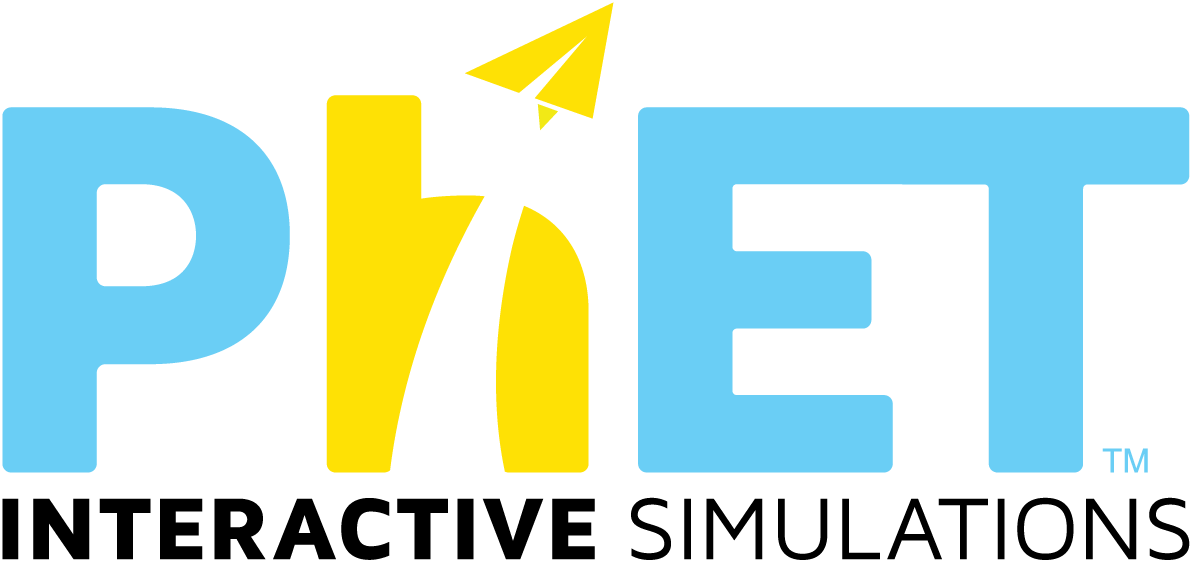
- Sign in / Register
- Administration
- My Bookmarks
- My Contributions
- Activity Review
- Edit profile
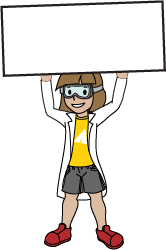
The PhET website does not support your browser. We recommend using the latest version of Chrome, Firefox, Safari, or Edge.


Transform Science Classes with Free Virtual Labs
Our top-notch, ad-free virtual lab simulations are designed to help you achieve just that. Engage your learners with interactive, hands-on experiments that make science education more accessible and enjoyable than ever before. 100% free, forever.
Balance the centrifuge by dragging and dropping the test tubes
Teacher-Crafted Virtual Labs for Enhanced Learning
Real-Time Feedback
With immediate feedback, virtual lab simulations allow students to learn from mistakes and effortlessly undo and try again for an enhanced learning experience.
Lab-Accurate Apparatus
Save time and money with our virtual lab simulations, a cost-effective solution compatible with Chromebooks and laptops.
Perfect for Middle & High School
Virtual labs provide a safe space for exploration, promote learning from mistakes, and different levels allow for differentiation across grade levels.
Discover Our Top Simulations

Gel Electrophoresis
In this virtual lab simulation, gel electrophoresis is used to separate dyes and see them in an agarose gel.

Transforming Bacteria
In this virtual lab simulation, users will practice transforming bacterial cells with a recombinant plasmid using the heat shock method.

Micropipetting Solutions
This virtual lab simulation allows the user to practice using a micropipette in a virtual laboratory environment.

“Using science lab simulations has made my students more confident in both scientific thinking skills and familiarity with science equipment and tools. I love how it allows them to interact with the lab materials, make mistakes, and see how their actions impact the outcome. The ability to have autonomy in the virtual lab and try different things while getting feedback gives them a deeper understanding of the concepts.”
- Mary Liu, Science Teacher, Weston High School
- Grades 6-12
- School Leaders
Don't Miss Today's Holiday Giveaway!🎁
35 Online Resources for Fantastic Free Science Videos for Kids and Teens
Because seeing is believing, especially when it comes to science.
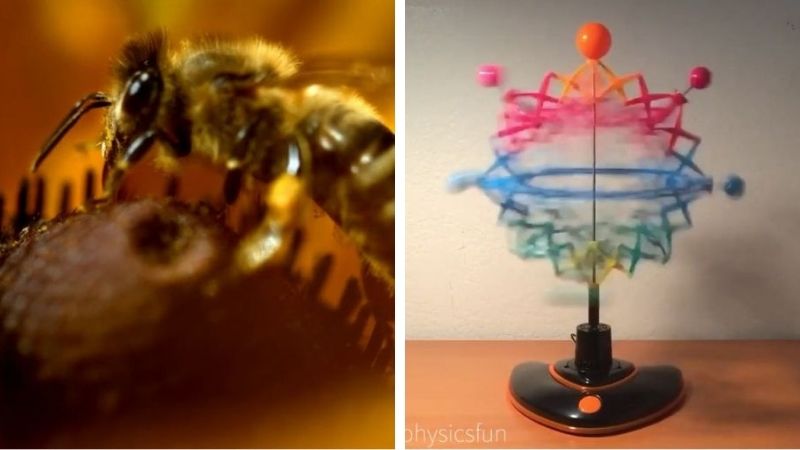
Teachers know that the easiest way to understand new concepts is to see them in action. But you can’t always do hands-on experiments or demos in the classroom. Plus, some things just aren’t possible—like a trip to outer space or a deep dive into the ocean. That’s when you need a good source for free science videos. Our picks include short and long options for students from pre-K through high school. Enjoy the show!
Free Science Videos on Instagram
Instagram videos are terrific when you’re short on time. They’re all shorter than ten minutes, and many are even briefer. Use these free science videos to introduce a lesson, illustrate a point, or as bell ringers to get class started.
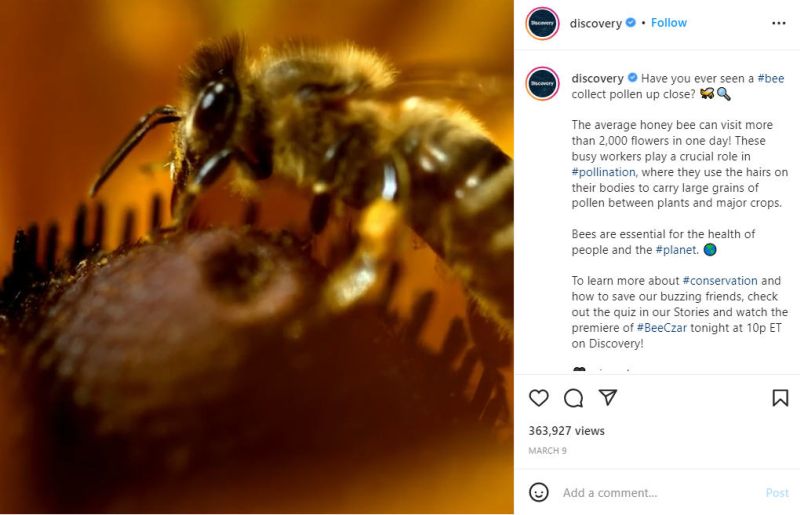
With lots of quick clips, especially of fascinating animals, Discovery’s Instagram videos are winners for multiple ages.
Check it out: @discovery
MEL Science
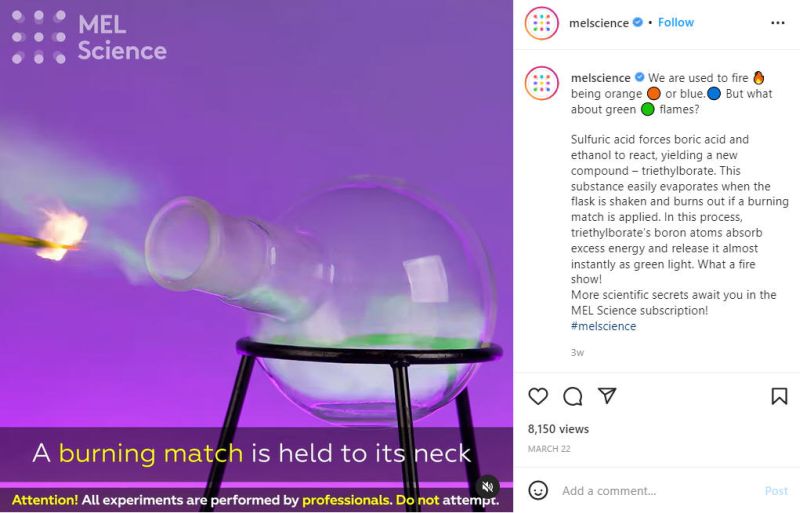
Hands-on science experiments and demos are always a favorite with kids, but not all of them are practical in the classroom. Fortunately, MEL Science has a whole collection of them in their Instagram videos!
Check it out: @melscience
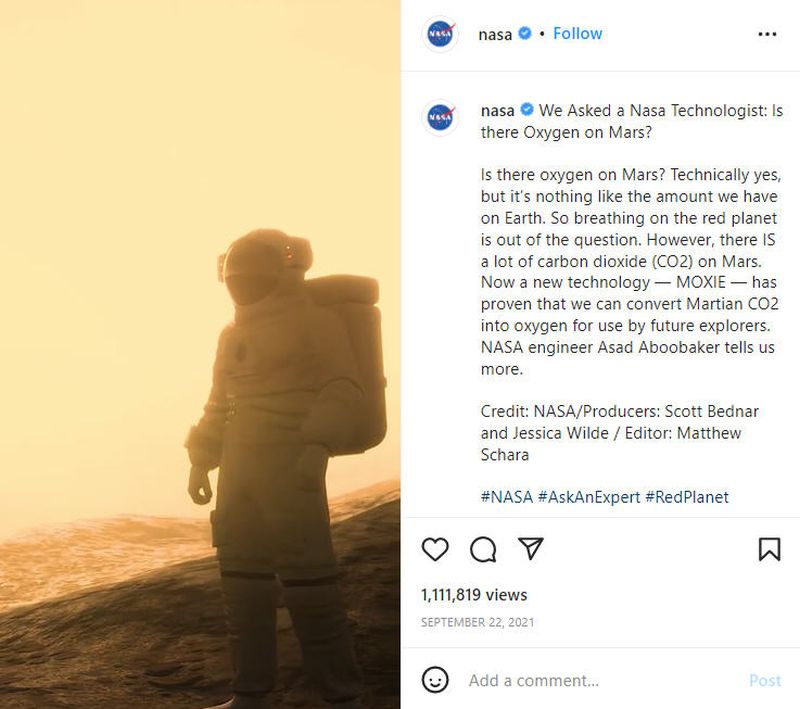
When it comes to space, there’s no better source than NASA. Their videos are informative and beautiful, with topics ranging from life on Earth to the furthest reaches of space.
Check it out: @nasa
National Audubon Society
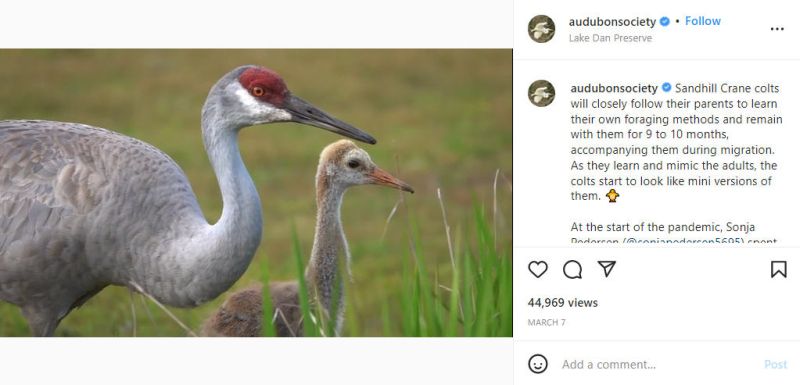
Doing a unit on birds? Tap into the Audubon Society’s quick videos for gorgeous footage of feathered fliers from around the world.
Check it out: @audubonsociety

Nature shares a wide variety of quick videos featuring adorable (and hilarious) animals, beautiful scenery, and much more.
Check it out: @nature
National Geographic
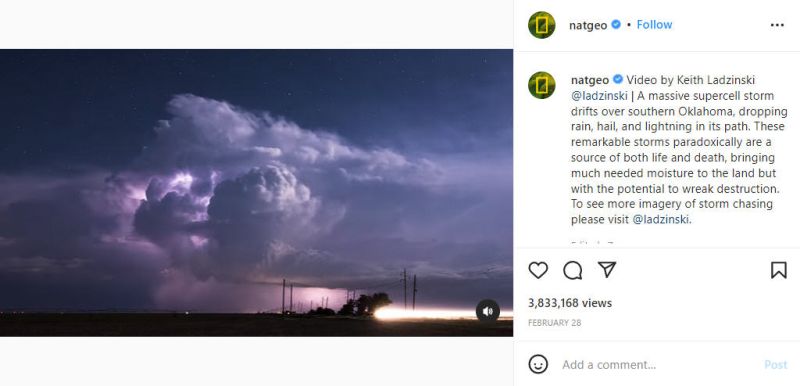
It’s no surprise that National Geographic has a robust Instagram account. The quality of their videos is stunning, just like you’d expect.
Check it out: @natgeo
Physics Fun
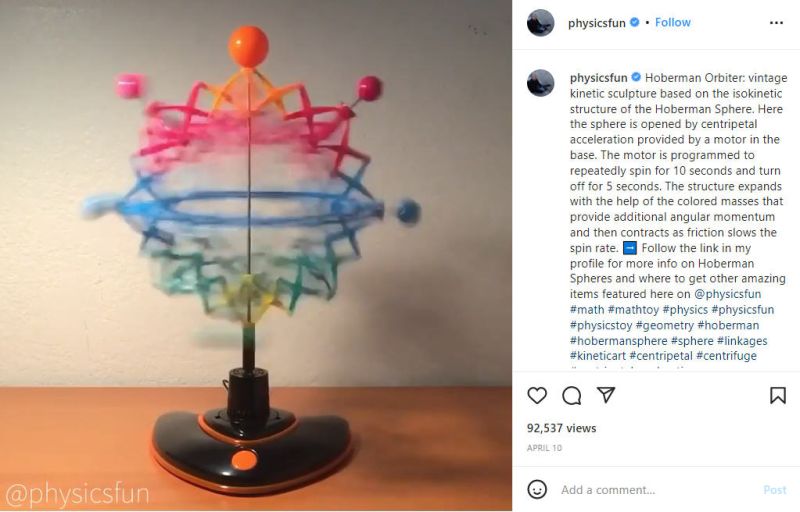
The oddly mesmerizing videos from Physics Fun show physics toys in action. The text explains the science behind it all.
Check it out: @physicsfun
ScienceAlert
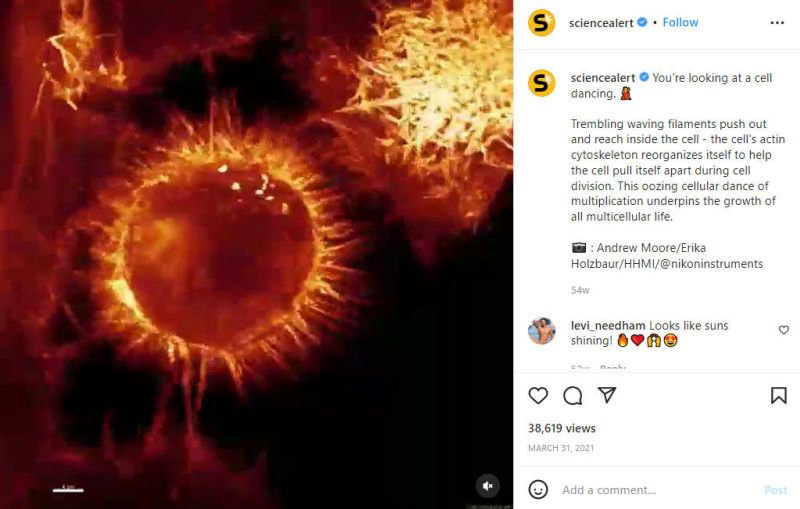
ScienceAlert rounds up the latest news stories about scientific topics of all kinds. Their Instagram video feed highlights some of the coolest new science videos out there.
Check it out: @sciencealert
Science Channel
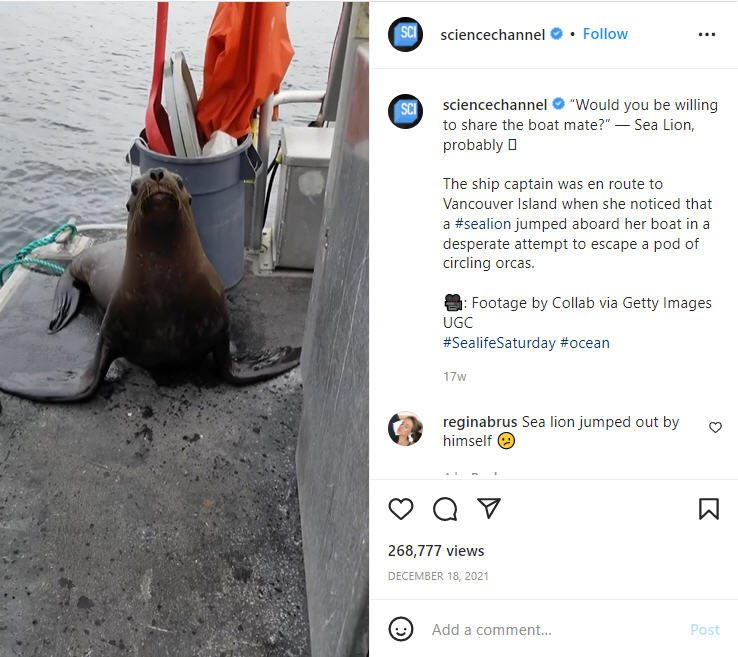
The Science Channel’s Instagram feed includes its own videos, plus highlights from related channels like Animal Planet.
Check it out: @sciencechannel
Science Magazine

Science magazine keeps you up to date on the latest science news. Their Instagram videos highlight new discoveries and amazing finds.
Check it out: @sciencemagazine
Free Science Videos on YouTube
On YouTube, free science videos vary widely in length and depth. Some are short clips, while others can fill a whole class period with detailed information on a topic. That means you’re sure to find something that will work for your class!
AsapScience
If you spend any time on social media, you’ve almost certainly seen some of AsapScience’s work. These hand-drawn free science videos are as fun to watch as they are informative, so it’s easy to see why they’re so popular. (Many of these will be more appropriate for older students, so pre-screen before you play.)
Check it out: AsapSCIENCE
This series explores more of those nagging questions you’d love to know the answers to, like, “Does my dog know what I’m thinking?” The conversational tone makes even complex topics easy to understand.
Check it out: Be Smart
Clarendon Learning
Clarendon Learning is a one-stop shop for complete free lesson plans on a variety of subjects. They also have an extensive video library, including dozens of science videos that are perfect for an elementary school audience.
Check it out: Clarendon Learning Science
CrashCourse
Getting ready to introduce a new topic to your class? Start off with a CrashCourse video. These quick overviews of detailed topics are fast and engaging and will prepare your students to take a more detailed look at things. The videos were made with adults in mind, so they’re best for middle and high school kids.
Check it out: CrashCourse
Finding Stuff Out
This Canadian TV series explores topics that interest kids, with a kid host to lead the way. Full episodes are about 20 minutes, just long enough to hold their attention.
Check it out: Finding Stuff Out
Home Science
Home Science is another channel showing hands-on science experiments. These simple videos don’t include any narration, so use them as an accompaniment to a lesson that provides more info.
Check it out: Home Science
How Stuff Works
You’ll find a huge variety of topics here, all done in a casual style that’s easy for kids to relate to. Be aware that some of these videos are a little more PG-13 than G, so watch in advance to make sure they’re appropriate for your audience.
Check it out: How Stuff Works
The Infographics Show
Need a constant source of new videos? The Infographics Show has you covered. Each day, they upload a new video full of numbers and statistics to answer life’s important and not-so-important questions. Their content varies, but many cover science topics. They’re not all appropriate for younger kids, so preview before showing in class.
Check it out: The Infographics Show
MinuteEarth
MinuteEarth has a regularly updated collection of short, free science videos all about Earth. We especially love that there’s a whole channel of videos in Spanish (MinutoDeLaTierra) , too.
Check it out: MinuteEarth
When you want longer videos than Instagram can provide, visit NASA’s YouTube channel. Their video collection includes recordings of launches and landings as well as plenty of other important space-related topics.
Check it out: NASA’s Video Gallery
National Geographic Kids
Help kids explore the world, both near and far, with Nat Geo Kids videos. Learn amazing facts about ice cream, robots, inventions, droids, and more. You name it—Nat Geo Kids has it!
Check it out: National Geographic Kids
Operation Ouch
This UK-based YouTube channel focuses mainly on the human body, exploring how it works through fun videos. Their selection includes videos featuring kids with health challenges and disabilities, putting a real face to these conditions to help students better understand them.
Check it out: Operation Ouch
Popular Science
Popular Science has been covering fascinating topics in its magazine for nearly 150 years. So it’s no surprise they have an archive of videos on pretty much any subject you can think of. Some are more in-depth than others, so teachers of all ages will find useful, free science videos here.
Check it out: Popular Science
Science Bob
Science Bob’s videos are a combination of experiments you can try yourself and experiences you probably can’t replicate. Whether he’s building a baking soda volcano or floating through zero gravity with 2000 ping-pong balls, these free science videos are sure to entertain.
Check it out: Science Bob
Science Kids
Science Kids rounds up free science videos from YouTube and other sources in one place. They cover a wide range of topics, like weather, engineering, and video-game technology, just to name a few.
Check it out: Science Kids
Scientific American
Scientific American has been publishing its magazine since 1845, and its video archives are full of fascinating subjects. There are free science videos here for a range of ages and interests.
Check it out: Scientific American
Science Max
Science Max takes the same science experiments you might try in the classroom and supersizes them! These are things you probably can’t try at home, but your students will love watching these videos instead.
Check it out: Science Max
SciShow Kids
The Pre-K crowd will enjoy learning alongside Squeaks, a curious mouse puppet. SciShow Kids has a huge selection of free science videos on every topic imaginable, all aimed at little ones who are ready to learn.
Check it out: SciShow Kids
Sid the Science Kid
Chances are good that if you teach preschool, you already know about Sid the Science Kid. His fun and friendly approach to topics like muscles, whales, and bugs is beloved by kids everywhere. You’ll find some Sid the Science Kid videos on YouTube, and even more on the PBS Kids website.
Check it out: Sid the Science Kid
The Slow Mo Guys
Camera technology allows us to see the world in new ways, including in super slow motion. These free science videos let kids see things that happen too fast for the naked eye, making difficult concepts easier to understand.
Check it out: The Slo Mo Guys
Socratica Kids
What is it about puppets that just make learning more fun? Socratica’s free videos star friendly puppets that aim to help pre-K kids get ready for school by learning the basics of science and math topics.
Check it out: Socratica Kids
Sport Science
There’s plenty of science behind kids’ favorite sports. This video series from ESPN looks at the science involved in running the fastest, jumping the highest, kicking the hardest, and more.
Check it out: Sport Science
Steve Spangler’s Sick Science
Steve Spangler has all the coolest science experiments and demos, the ones that make kids go “wow!” You can watch his videos on their own or use his directions and explanations to complete hands-on science activities in class.
Check it out: Steve Spangler’s Sick Science
Tell Me Why
The Tell Me Why s eries from The Explained Channel seeks to answer the never-ending “but WHY?” inquiries from kids. These fun videos offer a light-hearted look at all sorts of science concepts.
Check it out: Tell Me Why
According to creator Derek Muller, Veritasium is the “element of truth.” Derek brings science to life with interviews, quizzes, and even two-part videos, in which you get to predict the outcome of an experiment then see the results.
Check it out: Veritasium
While you’re on YouTube, why not drop by the WeAreTeachers page ? We’re always adding new videos just for teachers, like How to Print on Post-it Notes or Making Stress Balls for the Classroom . Be sure to subscribe so you’ll always know what’s new!
Plus, check out the best science websites for middle and high school ..
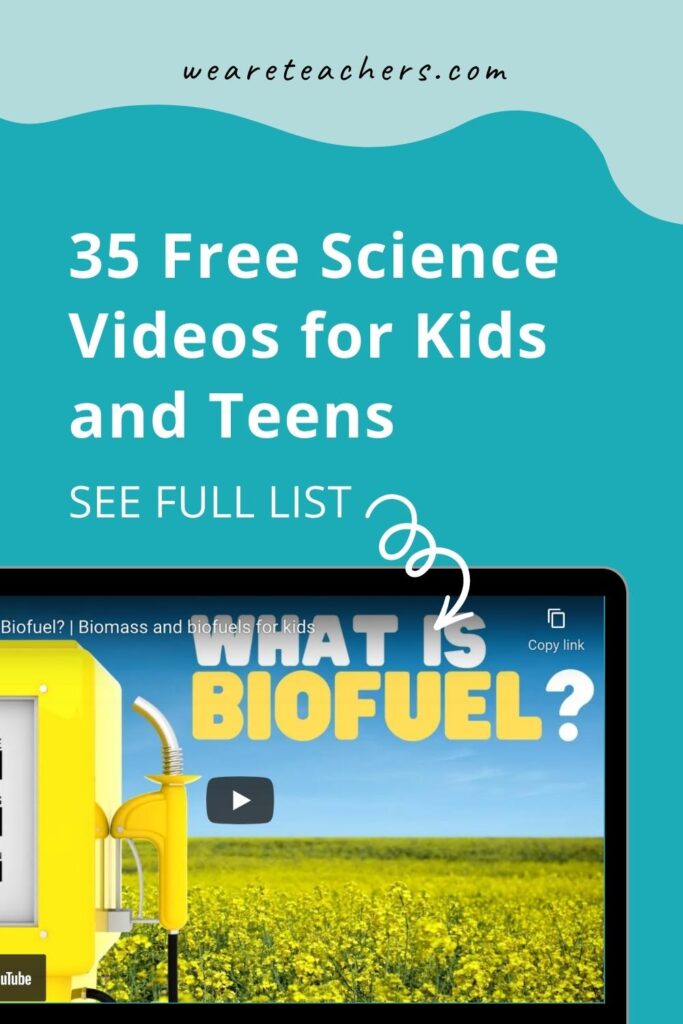
Copyright © 2024. All rights reserved. 5335 Gate Parkway, Jacksonville, FL 32256
Science Lab
Scaredy sand, lava lamp hack, ghost glove, ocean in a bottle, human spirograph, floating penny.
- Terms of Use
- Privacy Policy
- Your California Privacy Rights
- Children's Online Privacy Policy
- Interest-Based Ads
- About Nielsen Measurement
- Do Not Sell My Info
- National Geographic
- National Geographic Education
- Shop Nat Geo
- Customer Service
- Manage Your Subscription
Copyright © 1996-2015 National Geographic Society Copyright © 2015-2024 National Geographic Partners, LLC. All rights reserved

Users – Students [CURRENT]
Science just got virtual.
We make science class the best part of your school day!
Science is more fun than you think!
STEM classes have a reputation for being hard. But technology has come a long way, and we’ve created a platform that takes you into a virtual world exploring scientific phenomena in a very exciting way. From digital simulations in Biology, Chemistry, and Physics to curriculum-based lessons, we make science easy and fun to learn.

Immersive visuals
Get ready for a whole new way to experience science. Our technology immerses you in a 3D world, letting you interact with scientific phenomena virtually.
Game-like experience
No boring textbooks here. Our interactive experiments and scrolly videos feel as engaging as playing your favorite video games.
Daily-life science
You really will use this when you grow up. Our platform includes examples that represent real-world applications of scientific principles.
Get ready to experience science visually

Science Table
The Gen Z Lab experience: Engaging and full of surprises
Science Table by Anatomage helps you visualize scientific concepts better with 60+ virtual experiments, all with stunningly realistic visuals. From interactive experiments to student-friendly video lessons, you’ll be amazed at just how awesome science can be.
Cinematic experience
Journey through a cinematic trip to measure carbon dioxide emission in various landscapes—from volcanoes and oceans to forests and industrial plants.
Gamified, collaborative sessions
Enjoy educational experiments like Radio Wave Communications or Air Hockey that let you have fun and learn science with friends.
Mistake-free
Mistake? It happens! Just tap a couple of buttons to undo. With Science Table by Anatomage, we’re actually fans of mistakes—they’re just stepping stones to your awesome science success.
It’s safe and sound
Explore a variety of chemical reactions, including safe, risk-free observations of Nuclear Fission chain reactions.
Science Table Lessons
A way to study science that just makes sense
Study science through video lessons that break down complex scientific concepts into digestible segments. With Science Table Lessons by Anatomage, you can scroll through chapters to explore molecular structures or the effects of gravity on different planets, making studying both educational and enjoyable.


Self-quizzing
End-of-chapter quizzes are available to help you assess your understanding and improve your overall learning performance.
Let’s Get Students Excited About Science
About science table.
Science Table’s platforms, Science Table and Science Table Lessons, inspire students and get them excited about learning science through virtual experiments, stunning visuals, and action-drive scrolling technology.
For Teachers
For Administrators
For Students
3350 Thomas Rd STE 150, Santa Clara, CA 95054

15 Best Virtual Lab and Experimentation Platforms
This post may contain affiliate links that allow us to earn a commission at no expense to you. Learn more

Discover the best virtual lab and experimentation platforms that make learning limitless.
Remember those dreadful days when academia and laboratory experiments were like oil and water, resisting each other fiercely? Those days when academic researchers would sigh despondently at the mention of lab work?
Well, those days are gone! Welcome to a world where academia and lab work walk hand in hand, thanks to virtual science labs and experimentation platforms.
This is a realm where learning knows no boundaries, where researchers need not grimace at the thought of a lab, where experiments are but a click away. Sounds like a dream? Let’s dive into this ocean of endless opportunities.
Table of Contents
Virtual lab and experimentation platforms have broken down the traditional barriers of laboratory learning, making them accessible, interactive, and user-friendly.
These platforms offer a plethora of benefits, making them not just a nice-to-have, but a must-have tool for academia.
They’re the superheroes of the academic world, swooping in to turn potentially complex, daunting lab experiments into engaging, insightful, and accessible activities.
If you’re still sitting on the fence, let’s take a look at the best of these virtual lab platforms and how they’ve revolutionized learning.
Best Virtual Lab and Experimentation Platforms
#1. praxilabs: best for virtual science lab experiments.

- Immersive virtual reality science labs
- Provides a platform where students can conduct science experiments
- Suitable for both high school and university students
PraxiLabs takes you on a virtual tour of science labs. It’s a magic carpet ride into the realm of science, where academia meets innovation.
From basic physics to intricate biology, PraxiLabs presents a multitude of experiments, beckoning learners and researchers to a world teeming with virtual possibilities.
What are the benefits of PraxiLabs?
- Wide variety: With labs from different science branches, it offers a broad spectrum of learning.
- Realism: Virtual reality environments offer real-world experimental experience.
- Inclusive: It’s designed to cater to various education levels, ensuring no one is left behind.
PraxiLabs strikes the perfect balance between the theoretical and the practical, morphing the learning space into an academic paradise. This is an essential tool for anyone looking to delve deeper into the secrets of science.
How much does it cost?
- $44.99 for 6 months
- $74.99 per year
Source: https://praxilabs.com
#2. LearnBrite: Best for VR-ready e-learning experiences
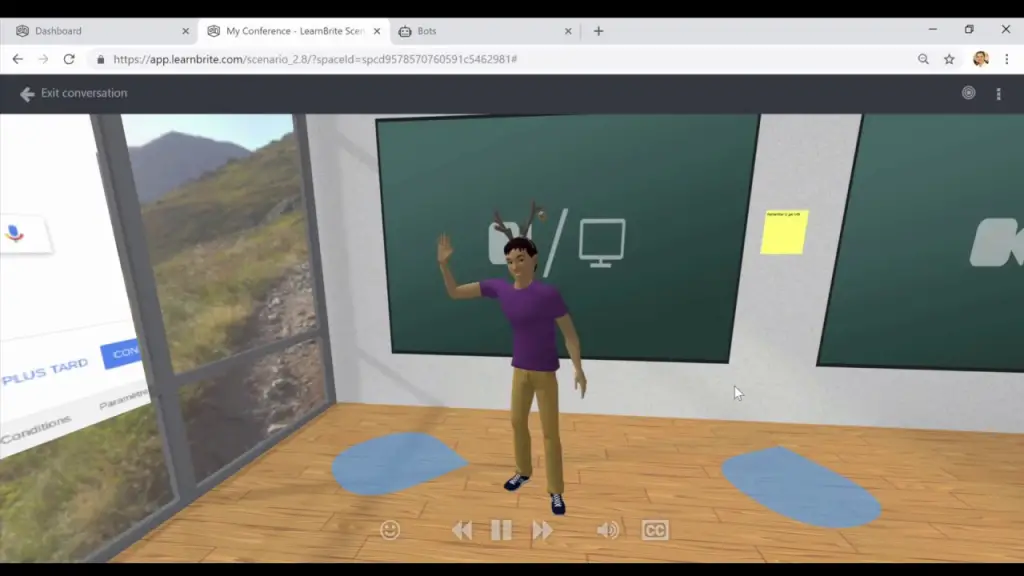
- Offers VR-ready e-learning modules
- Ensures immersive learning experiences
- Compatible with multiple devices
LearnBrite takes e-learning to a whole new level by providing VR-ready modules. It breathes life into the abstract concepts of academia, presenting them in a vivid and immersive virtual reality environment.
This tool is like the James Bond of the academic world, transforming mundane lessons into thrilling adventures.
What are the benefits of LearnBrite?
- Immersion: LearnBrite’s VR-based lessons allow students to dive deep into the topic at hand.
- Interactivity: Hands-on modules encourage active learning and retention.
- Device friendly: It’s compatible with a multitude of devices, making learning accessible anytime, anywhere.
If you’re looking for a game-changer in academia, LearnBrite is your answer. It’s a potent blend of technology and learning, fostering an engaging and interactive academic journey.
- VR Scenario: $99 per month
- VR Workplace: $799 per month
- VR Campus: Custom price
Source: https://www2.learnbrite.com
#3. LabXchange: Best for customizable science learning
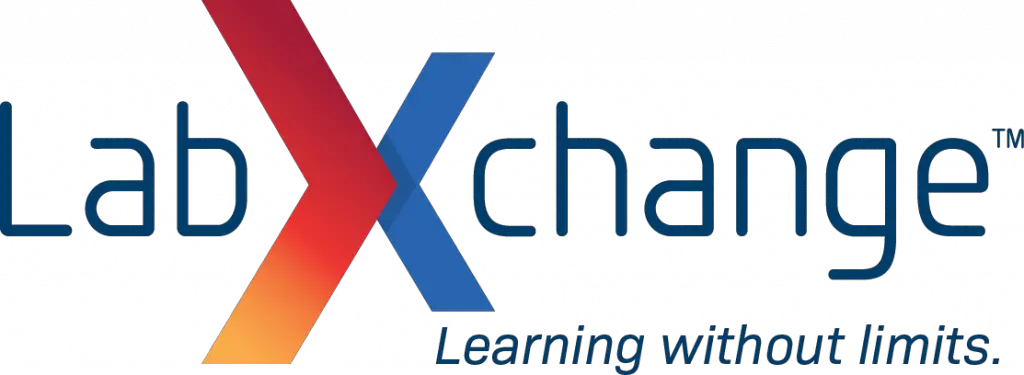
- Provides a platform for customizable science learning
- Fosters a community of learners and educators
- Collaborative learning environment
Imagine a playground where science and creativity are the best buddies, where you’re the architect of your learning process.
That’s LabXchange. It’s a platform where academia gets a personal touch, allowing learners to design their own educational journey.
What are the benefits of LabXchange?
- Personalized learning: Learners can customize their own academic pathways, enhancing understanding and interest.
- Collaboration: It facilitates collaborative learning, fostering a vibrant academic community.
- Diversity: LabXchange offers a wide range of science learning modules, catering to diverse interests.
LabXchange shakes up the traditional educational framework, making learning a more personal and engaging process. This is where academia and creativity collide, resulting in a vibrant learning environment.
Source: https://www.labxchange.org
#4. Pivot Interactives: Best for real-world science lab videos

- Offers real-world science lab videos
- Promotes interactive learning
- Enhances critical thinking
Pivot Interactives is an open ticket to the world of science. It helps academia delve deeper into real-world phenomena through a lens of exploration and discovery.
What are the benefits of Pivot Interactives?
- Real-world understanding: Its videos bring real scientific phenomena into classrooms, enhancing comprehension.
- Interactivity: Students can manipulate videos, fostering active learning.
- Critical thinking: By providing real-world context, it nurtures problem-solving and analytical skills.
Pivot Interactives takes academia on a voyage into the heart of real-world science, transforming abstract concepts into tangible experiences.
It’s a tool that enhances academic understanding and application.
- Classroom: $5.50 per seat
- District: Custom price
Source: https://www.pivotinteractives.com
#5. LabSim: Best for IT certification preparation
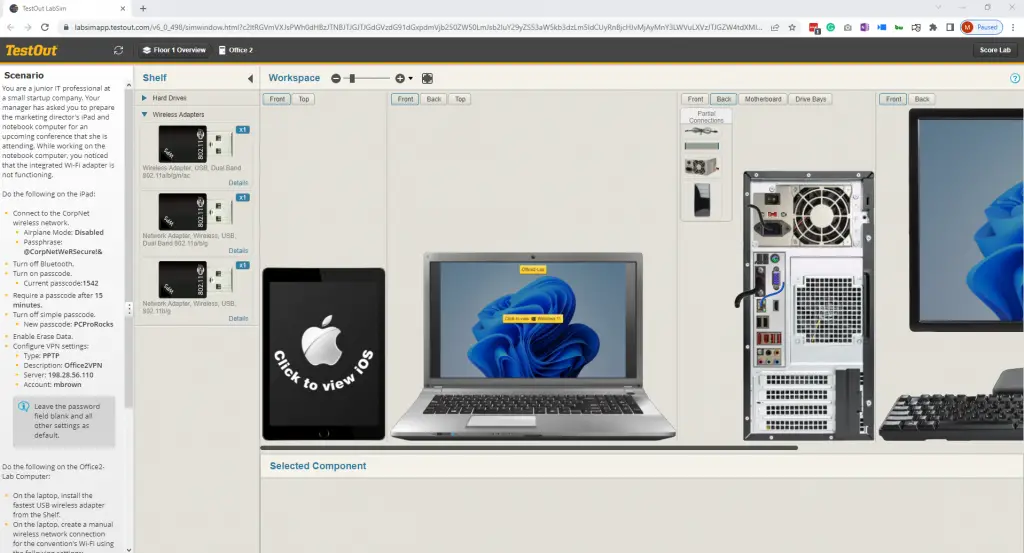
- Offers simulation-based learning for IT training
- Provides a risk-free environment for practical application
- Extensive content library for numerous IT certifications
In the cybernetic arena where IT knowledge is a potent weapon, LabSim reigns supreme. This platform propels learners into the realm of IT, where academia meets hands-on experience.
It takes the abstract principles of IT and spins them into a web of practical, understandable knowledge.
What are the benefits of LabSim?
- Practical application: Enables learners to apply theoretical concepts in a simulated environment.
- Risk-free learning: Provides a safe space to make mistakes and learn from them.
- Certification preparation: LabSims’ extensive library aids in preparing for various IT certification exams.
LabSim doesn’t just prepare students for exams; it equips them with the tools to navigate the ever-evolving landscape of IT. This is the go-to academic tool for any aspiring IT professional.
- Price available on request
Source: https://w3.testout.com
#6. Mel Science: Best for children’s science experiments

- Provides interactive science experiments for kids
- Encourages curiosity and hands-on learning
- Complements school science curriculum
Mel Science is like a wonderland where kids can indulge their curiosity, learn, and have fun all at once.
It’s a tool that makes academia exciting for young minds, transforming the usual yawn-inducing lessons into thrilling science adventures.
What are the benefits of Mel Science?
- Interactive learning: Engages young learners with hands-on experiments.
- Curiosity-driven: Encourages kids to question, explore, and learn.
- Complements curriculum: Aligns with school curricula to reinforce classroom learning.
Mel Science is like a kindle for young minds, sparking curiosity and fostering a love for learning. It’s an essential tool in shaping the academia of tomorrow.
- $39.90 per month
Source: https://melscience.com
#7. Labster: Best for interactive 3D science simulations
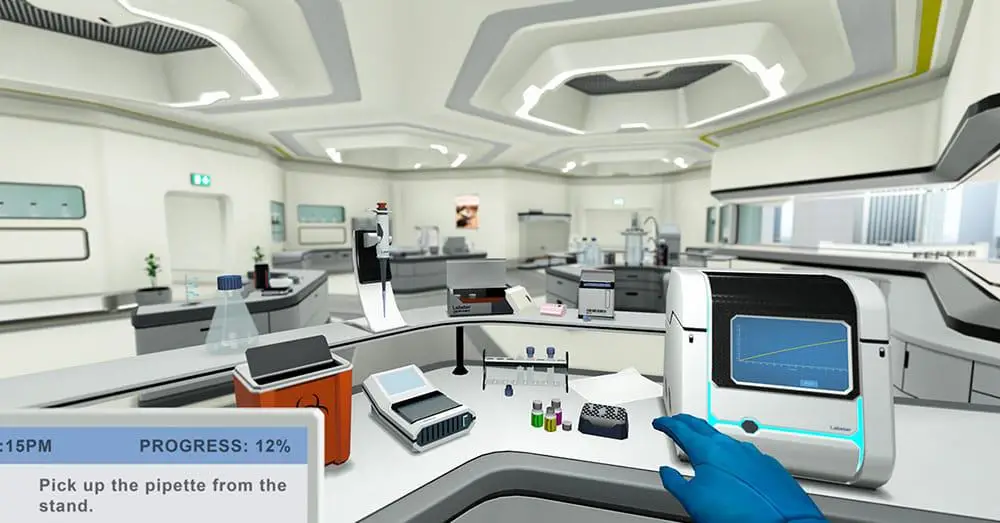
- Offers a wide range of lab simulations
- Facilitates comprehensive understanding through 3D visualization
- Makes learning more engaging and fun
Picture yourself in a 3D lab, making the most of your lessons, engrossed in a thrilling, lifelike learning experience.
That’s Labster for you. This tool, with its strikingly real simulations, brings a paradigm shift in academia by bridging the gap between theory and practical.
What are the benefits of Labster?
- Enhances understanding: By using 3D visualization, it ensures a deeper understanding of the subject matter.
- Increases engagement: Interactive learning boosts student engagement and motivation.
- Accessibility: With a digital platform, Labster allows students to experiment without any physical constraints.
Labster transforms laboratory learning from mundane to exciting, paving the way for a more immersive, interactive learning experience.
It’s not just a tool, it’s an adventure waiting to unfold in the academic world.
- Group quote: $79 per student
- Single user: $109
Source: https://www.labster.com
#8. Gizmos: Best for online science and math simulations

- Provides interactive science and math simulations
- Enhances understanding of complex concepts
- Encourages active learning
Welcome to Gizmos, the platform that turns the potentially daunting world of math and science into an exciting playground of knowledge.
It’s a virtual powerhouse where academia gets an adrenaline rush, making math and science tangible, interactive, and fun.
What are the benefits of Gizmos?
- Conceptual understanding: Its simulations help students grasp complex math and science concepts.
- Active learning: Interactive nature of Gizmos promotes engagement and active learning.
- Versatility: Catering to various grade levels, Gizmos is suitable for a wide range of learners.
Gizmos is not just a tool; it’s a lifeline in the vast ocean of math and science. It takes the abstract nature of these subjects and renders them approachable and engaging.
- $1.01 per seat in a month
- $0.84 per seat in 6 months
- $0.79 per seat per year
Source: https://gizmos.explorelearning.com
#9. EON Reality: Best for immersive virtual reality education
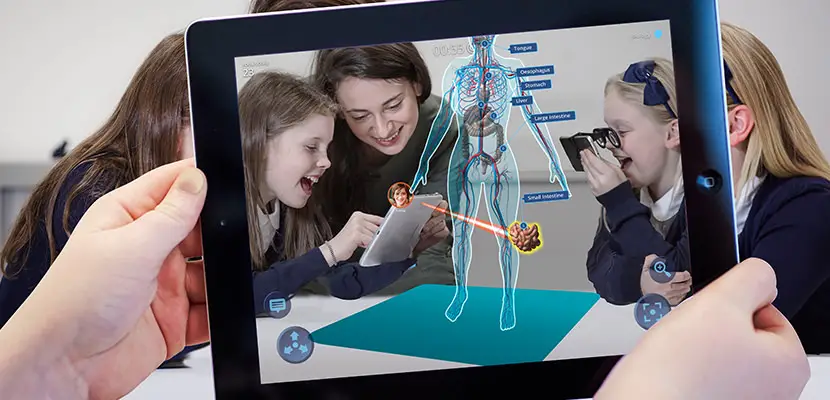
- Provides immersive virtual reality (VR) education experiences
- Offers a wide range of educational content and simulations
- Fosters interactive and engaging learning environments
Step into the world of EON Reality, where education transcends the boundaries of traditional classrooms.
EON Reality leverages the power of immersive virtual reality to create captivating educational experiences that transport learners into a realm where knowledge and imagination collide.
What are the benefits of EON Reality?
- Immersive learning: Virtual reality technology creates realistic and immersive environments, enhancing comprehension and engagement.
- Extensive content library: EON Reality offers a diverse range of educational content and simulations across various subjects and disciplines.
- Interactive experiences: Learners can actively interact with virtual objects and environments, promoting hands-on learning and exploration.
EON Reality is a gateway to a new era of education, where learners can step into virtual worlds and embark on transformative learning journeys.
It’s a game-changer that brings education to life, offering endless possibilities for immersive and interactive learning experiences.
- Students: $36 per user per month paid yearly
- Teachers: $55 per user per month paid yearly
Source: https://eonreality.com
#10. MERLOT Lab: Best for peer-reviewed online learning materials
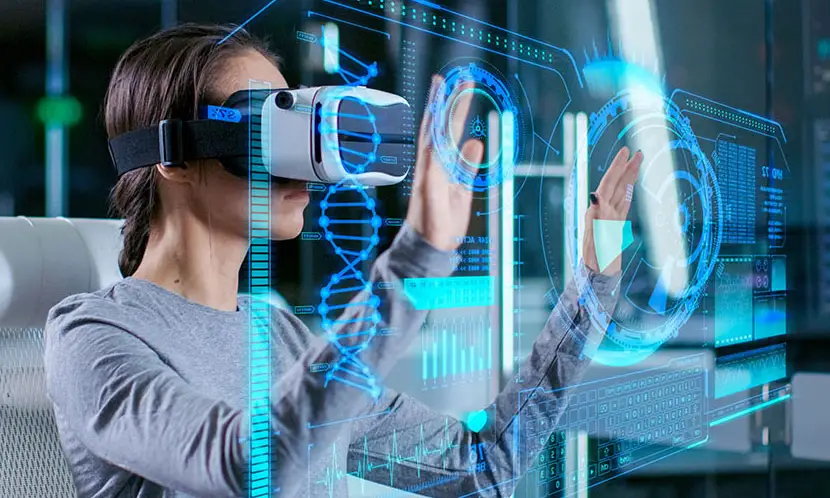
- Offers peer-reviewed learning materials
- Serves as an academic community for sharing resources
- Encourages collaborative learning
MERLOT Lab is a platform where peer-reviewed materials serve as an academic currency. This promotes a culture of shared knowledge and mutual learning.
What are the benefits of MERLOT Lab?
- Quality resources: Peer-reviewed materials ensure reliable and high-quality learning resources.
- Collaboration: The platform promotes exchange of ideas and resources among learners.
- Variety: Offers a wide array of learning materials across different subjects.
MERLOT Lab is the lighthouse guiding academia through the tumultuous sea of information. It’s a haven for researchers, students, and educators, ensuring access to reliable and top-quality learning resources.
- Not provided
Source: https://virtuallabs.merlot.org
#11. Pearson MyLab: Best for personalized digital learning
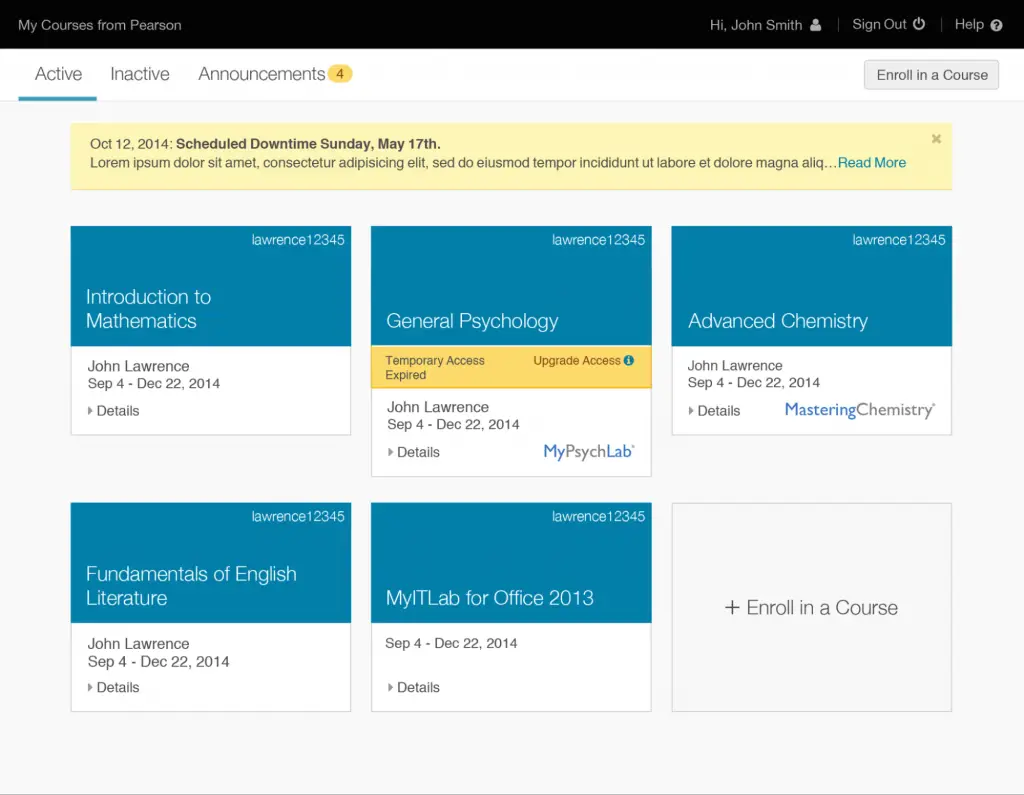
- Offers personalized digital learning experiences
- Tracks and adapts to students’ progress
- Integrates with many academic institutions’ systems
Pearson MyLab is like a tailor for academia, carefully crafting learning experiences to fit each student’s unique needs. It’s a platform where learning gets personal, enabling students to learn at their own pace and style.
What are the benefits of Pearson MyLab?
- Personalization: Tailors the learning experience based on each student’s progress and understanding.
- Progress tracking: Keeps tabs on the student’s performance and adapts the learning material accordingly.
- Seamless integration: Works harmoniously with academic institutions’ systems for a smooth learning experience.
Pearson MyLab isn’t just a learning platform; it’s an academic companion that adapts to students’ learning curves. This is the secret weapon for any student aiming for academic success.
- $10.99 per month
Source: https://mlm.pearson.com
#12. ChemCollective: Best for online chemistry activities
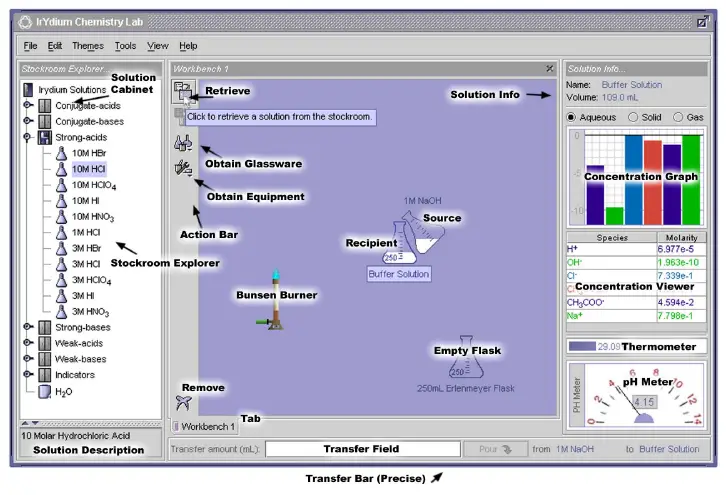
- Offers a variety of online chemistry activities
- Facilitates interactive and hands-on learning
- Covers a wide range of chemistry concepts
Chemistry can be a volatile subject, but with ChemCollective, it becomes an exhilarating adventure.
This platform invites learners into a fully-equipped virtual laboratory, where they can explore the captivating world of chemistry through interactive activities and experiments.
What are the benefits of ChemCollective?
- Interactive learning: Engages students through hands-on virtual chemistry activities.
- Conceptual understanding: Reinforces chemistry concepts through practical application.
- Comprehensive coverage: Covers a wide range of topics, catering to various learning needs.
ChemCollective transforms the often intimidating realm of chemistry into an accessible and enjoyable journey. It’s a catalyst for academic success in the realm of chemistry.
- Not provided on the platform
Source: https://chemcollective.org
#13. PhET Interactive Simulations: Best for science and math simulations
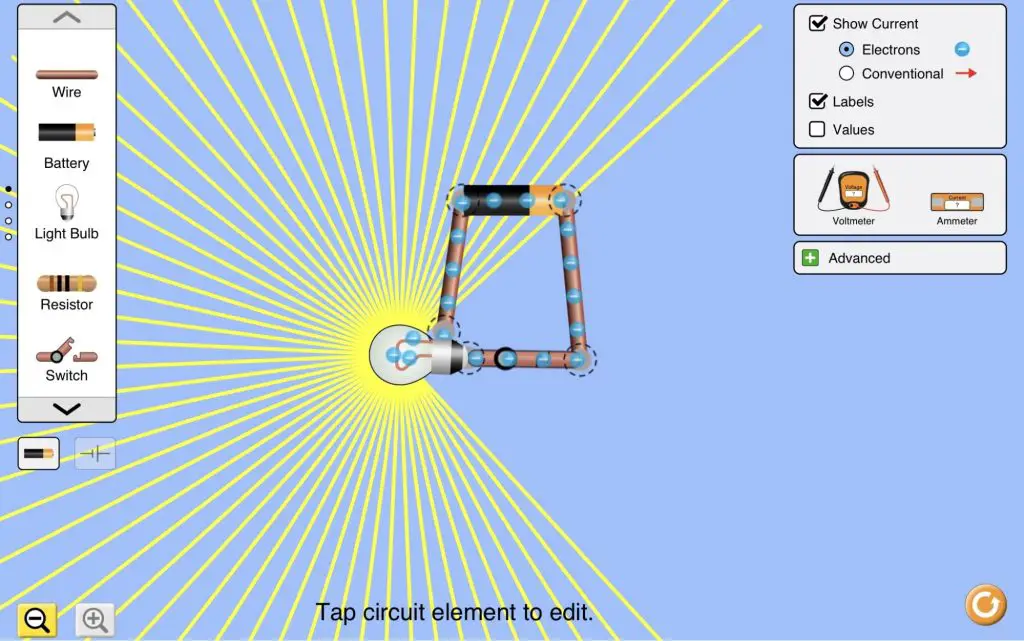
- Covers a wide range of topics
- Promotes inquiry-based learning
PhET Interactive Simulations is like a virtual playground for science and math enthusiasts.
This platform is a treasure trove of interactive simulations that breathe life into abstract concepts, allowing learners to explore, experiment, and uncover the wonders of the scientific and mathematical realms.
What are the benefits of PhET Interactive Simulations?
- Inquiry-based learning: Encourages exploration and inquiry, fostering a deeper understanding.
- Versatility: Covers a wide range of scientific and mathematical topics, catering to diverse needs.
- Engagement: Interactive simulations captivate learners, promoting active participation.
PhET Interactive Simulations is the magician’s hat that pulls out captivating scientific and mathematical experiences. It’s a tool that transforms passive learning into an active and engaging adventure.
Source: https://www.colorado.edu
#14. Lab4Physics: Best for physics learning with everyday materials
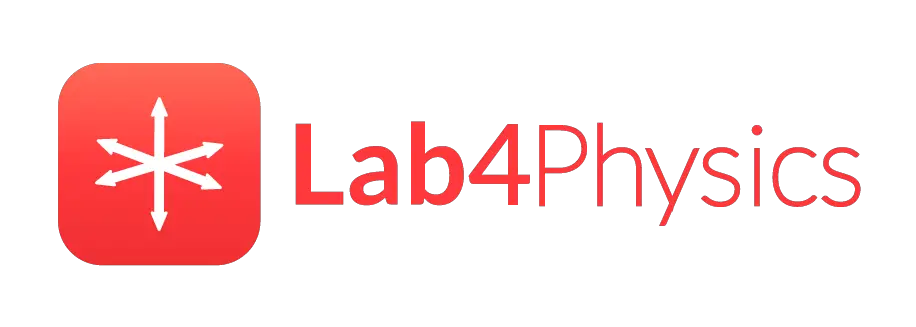
- Focuses on physics experiments using everyday materials
- Promotes hands-on and practical physics learning
- Allows students conducting science experiments to engage in real-world applications of physics
Lab4Physics brings physics out of the textbooks and into the real world, making it tangible and relatable.
It offers a collection of experiments that can be conducted using everyday materials, allowing students to explore the fundamental principles of physics through hands-on learning.
What are the benefits of Lab4Physics?
- Practical application: Encourages students to connect physics concepts with real-world phenomena.
- Accessibility: Utilizes everyday materials, making experiments accessible and affordable.
- Engagement: Hands-on experiments foster active participation and enhance understanding.
Lab4Physics is a bridge that connects the theoretical concepts of physics with real-world applications. It’s an invaluable tool for aspiring physicists, empowering them to explore and experiment with the laws of the universe.
- $45.99 for each user per six months
Source: https://lab4u.co
#15. zSpace: Best for interactive AR/VR education experiences
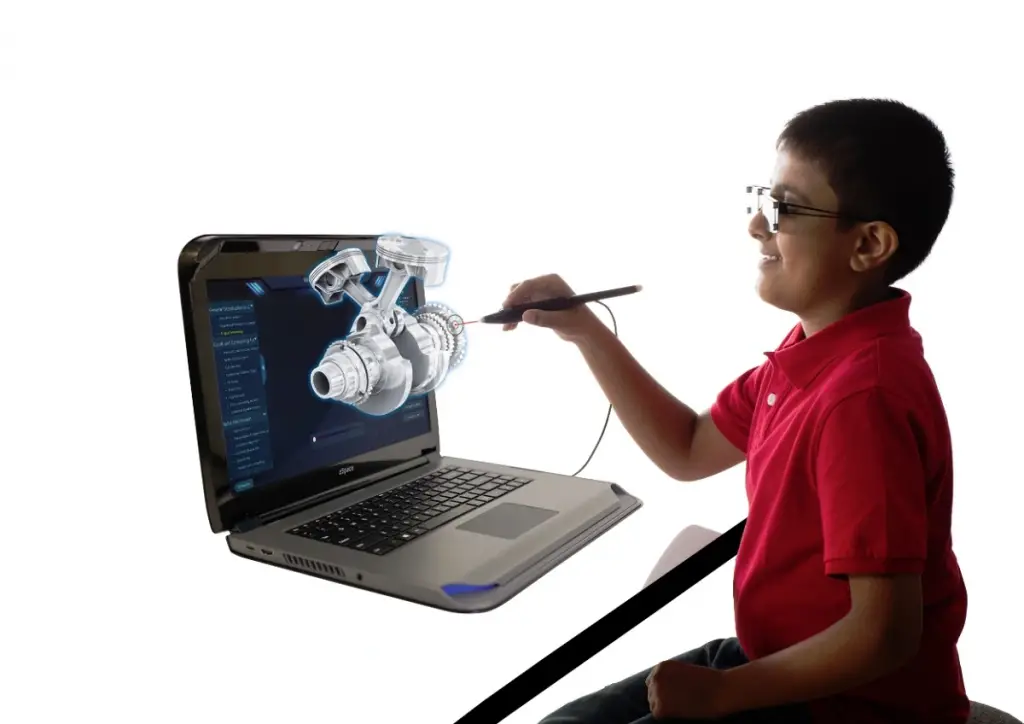
- Provides interactive augmented reality (AR) and virtual reality (VR) experiences
- Enhances engagement and comprehension
- Covers various subjects and disciplines
zSpace is where education transcends traditional boundaries and becomes an immersive and interactive adventure.
This platform harnesses the power of augmented reality and virtual reality, revolutionizing the learning experience and transporting learners to captivating virtual worlds.
What are the benefits of zSpace?
- Immersive learning: AR/VR experiences captivate learners, promoting deeper engagement and understanding.
- Multidisciplinary approach: Covers various subjects, expanding the horizons of academic exploration.
- Experiential learning: Encourages learners to actively participate and interact with virtual environments.
zSpace is the gateway to a new dimension of learning, where imagination meets the current teaching methodology. It’s a powerful tool that ignites curiosity, sparks creativity, and immerses learners in a transformative educational experience.
- Price available upon request
Source: https://zspace.com
In the realm of academia, virtual labs and experimentation platforms have emerged as the superheroes of learning. They have shattered the barriers of traditional laboratory experiences, making education interactive, accessible, and engaging.
From interactive 3D simulations to personalized digital learning, these virtual science lab apps have revolutionized the way we approach academia.
With a myriad of options available, educators and learners alike now have the power to explore, experiment, and unlock the boundless possibilities of knowledge in medicine, math, or even Earth science.
Embrace these virtual tools and embark on a journey where learning knows no limits. The future of education has arrived, and it’s virtual, immersive, and captivating.
There is more.
Check out our other articles on the Best Academic Tools Series for Research below.
- Learn how to get more done with these Academic Writing Tools
- Learn how to proofread your work with these Proofreading Tools
- Learn how to broaden your research landscape with these Academic Search Engines
- Learn how to manage multiple research projects with these Project Management Tools
- Learn how to run effective survey research with these Survey Tools for Research
- Learn how get more insights from important conversations and interviews with Transcription Tools
- Learn how to manage the ever-growing list of references with these Reference Management Software
- Learn how to double your productivity with literature reviews with these AI-Based Summary Generators
- Learn how to build and develop your audience with these Academic Social Network Sites
- Learn how to make sure your content is original and trustworthy with these Plagiarism Checkers
- Learn how to talk about your work effectively with these Science Communication Tools
Leave a Comment Cancel reply
Save my name, email, and website in this browser for the next time I comment.
We maintain and update science journals and scientific metrics. Scientific metrics data are aggregated from publicly available sources. Please note that we do NOT publish research papers on this platform. We do NOT accept any manuscript.
2012-2024 © scijournal.org
- Nanogirl's Lab
Science Experiments & Videos
- Nanogirl's Podcast
- Nanogirl and The Imaginauts
From explosive science to awesome engineering, watch some of Nanogirl's favourite experiments!
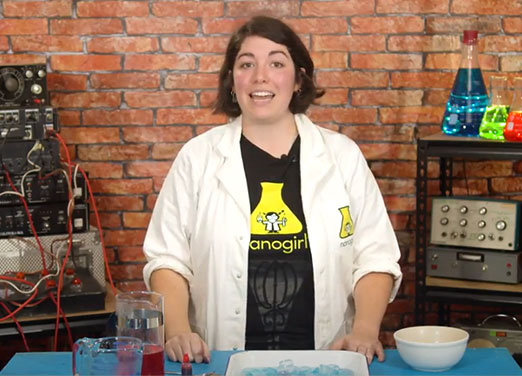
What are ocean currents?
Learn the science of ocean currents with Nanogirl marine biologist, Katey Fish.
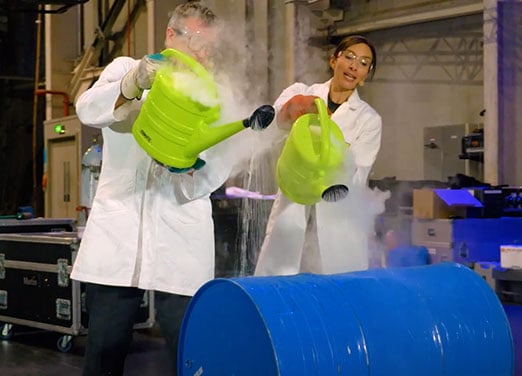
How to crush a steel drum using air pressure
Go behind the scenes of a Nanogirl Live! show to see how this amazing experiment works!
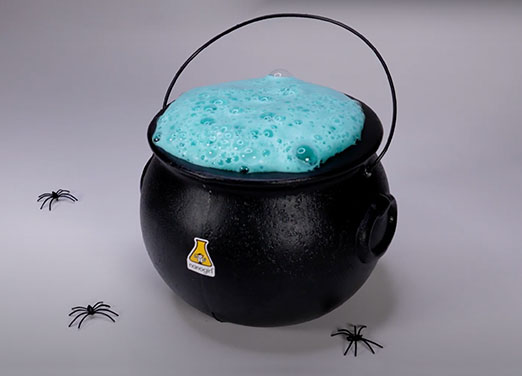
Nanogirl's Witches' Brew Halloween Experiment
Double, double, toil and trouble—fire burn, and cauldron bubble. Experiment with our Nanogirl Witches’ Brew this Halloween!
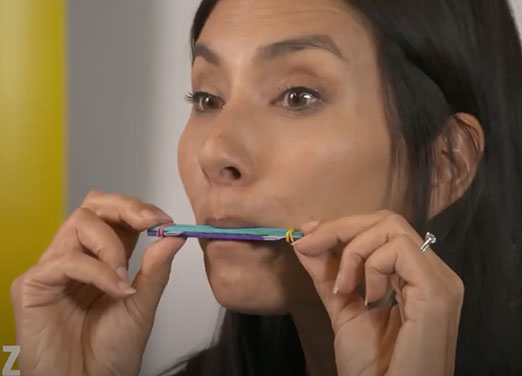
Make a harmonica
Try this simple experiment at home to make your own noisy harmonica using the science of vibration.

DID YOU KNOW?
Fireworks get their colour from different metals mixed in with the gunpowder, which burn brightly when ignited.
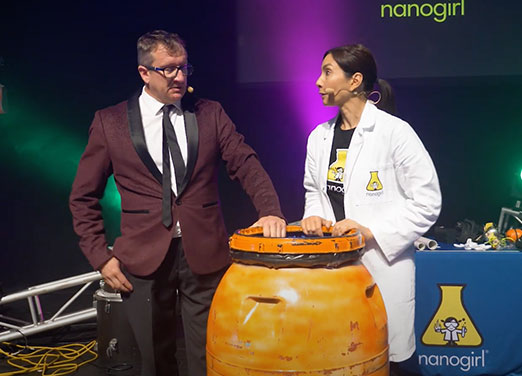
How to engineer an Airzooka
Go behind the scenes of a Nanogirl Live! show to see how Nanogirl and Boris can turn an old rubbish bin into an Airzooka that sends smoke rings flying!
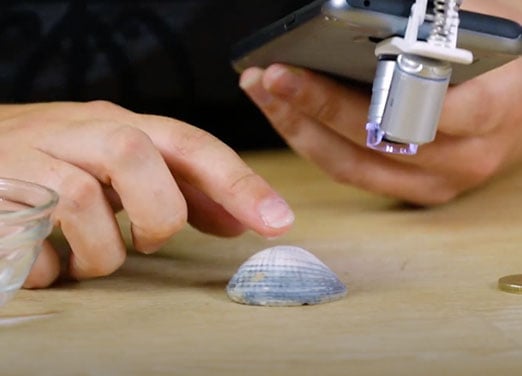
How to make rocks and shells fizz
Did you know you can make rocks fizz and bubble? Try this easy experiment at home!
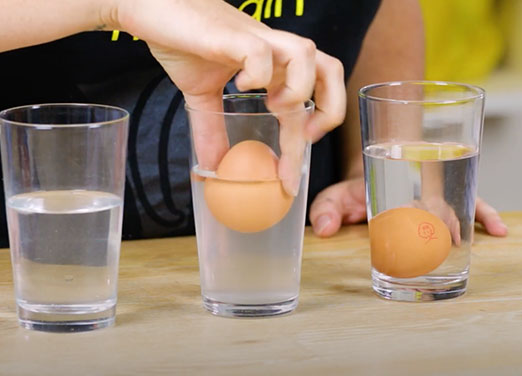
How salty is the sea?
We know sea water is salty - with this easy experiment you can find out just how salty it is where you live!
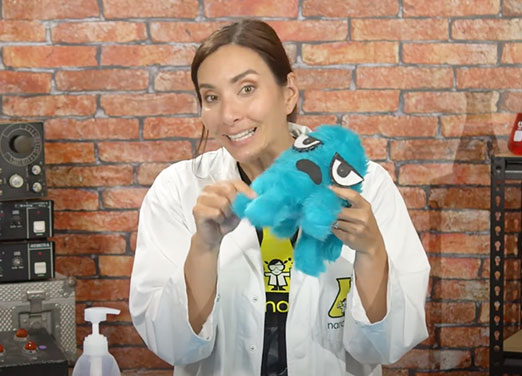
What is COVID-19?
COVID-19 explained, for kids!

There are 100,000 miles of blood vessels in an adult human body. If you laid them end to end, they would stretch around the Equator twice.
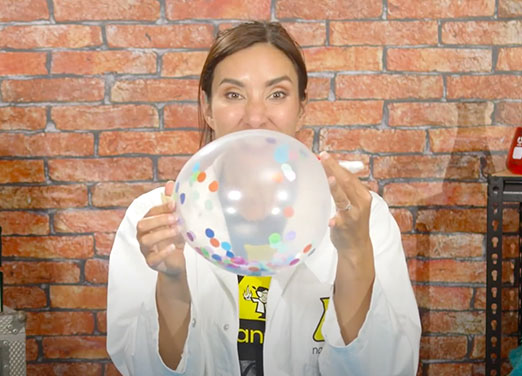
Make your own virus-fighting soap
Learn how to make your own, personalised soap to make hand washing fun!
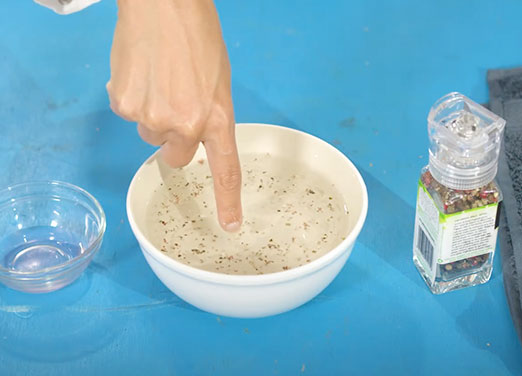
How does soap work?
Ever wondered how soap gets all those nasty germs off your hands when you wash them?
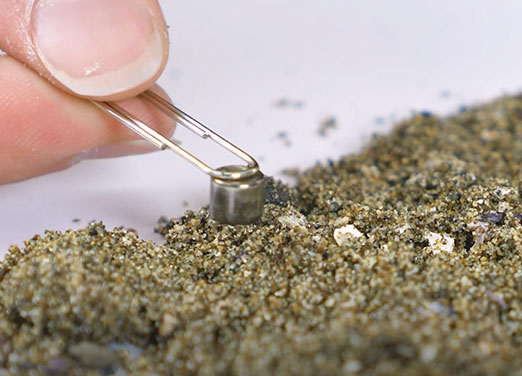
What’s sand made of?
Use an experiment to find out what’s in sand with this easy experiment you can do at home or at the beach!
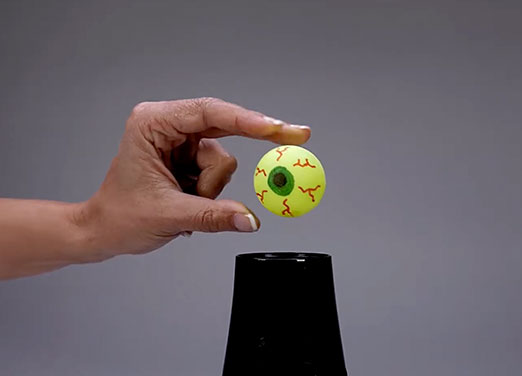
Halloween Floating Eye Science Experiment
A spooky experiment to learn all about Bernoulli’s Principle with your children this Halloween!

The Eiffel Tower in Paris is 15 cm taller in the summer than it is in the winter due to thermal expansion. It is engineered with special ‘expansion points’ to allow it to grow larger in the heat without damaging itself.
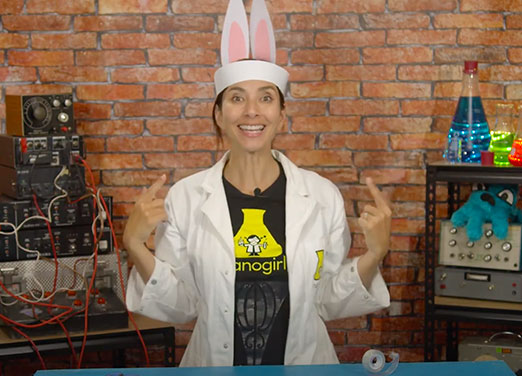
Why do animals have different shaped ears?
Learn the science behind why different animals have different shaped ears, then design and make your own animal ears!
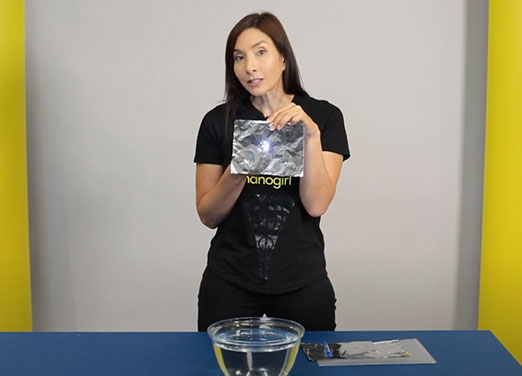
Why do stars twinkle?
Do stars actually twinkle, or is it just an illusion? Find out with this easy experiment using a torch, a bowl of water, a pen and some tin foil.
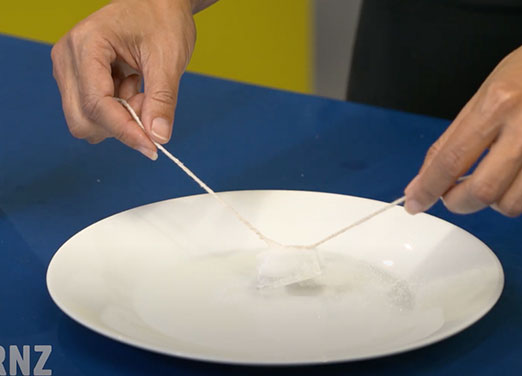
How to catch ice with string
Use the power of science to catch an ice cube using a piece of string.
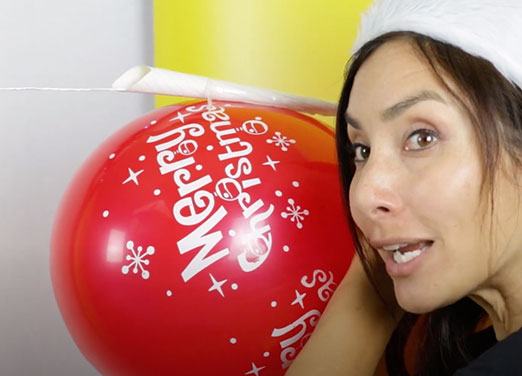
Make a balloon rocket
How fast must Santa's sleigh travel to deliver presents to every child in just one day? Practice measuring speed by making a balloon rocket!
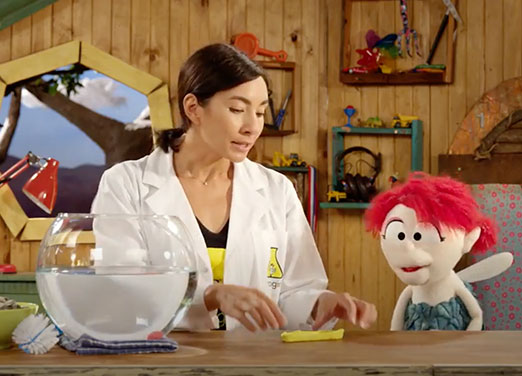
Why do boats float?
Nanogirl visited Fern on The Moe Show to reveal the science of why boats float.
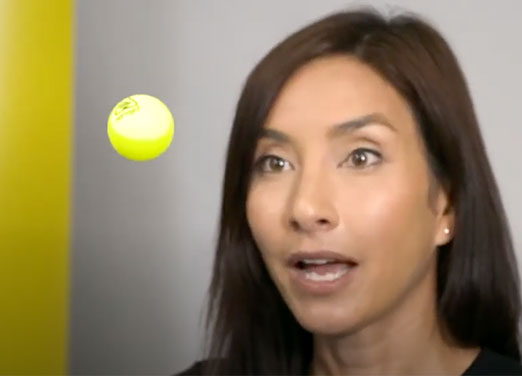
Make a ping pong ball fly
Wow your friends with this amazing feat of science - it’s easy when you know how!
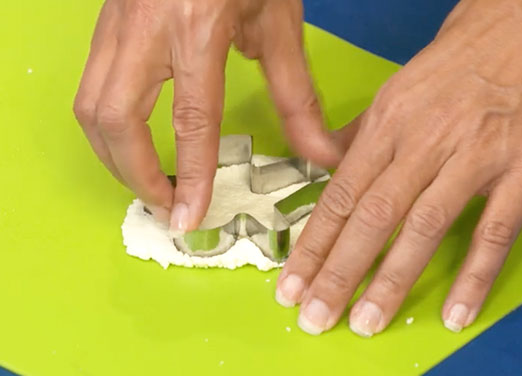
Make plastic from milk!
Did you know plastics can be made from lots of different things? Try this easy experiment at home to make your own plastic from milk!
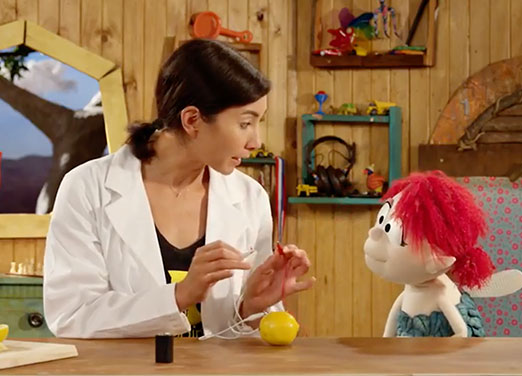
How to make a lemon battery
Nanogirl and Fern the Fairy make a lemon battery using science on The Moe Show.
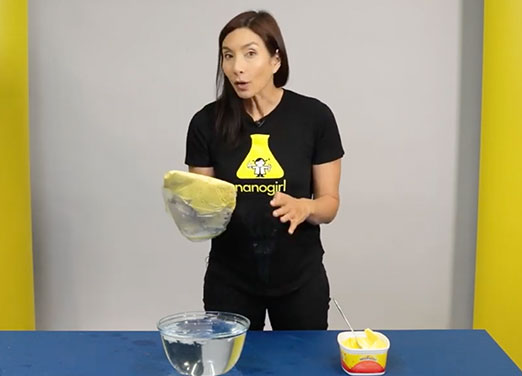
Make your own blubber
Have you ever wondered how some animals survive in the cold? Well for some, blubber is the answer! Why not try this experiment to see how blubber can protect you from the cold?
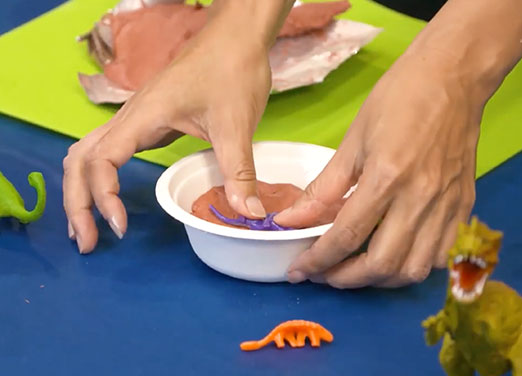
Make a dinosaur fossil
Make your own pretend dinosaur fossils at home, all you need is some clay, plaster of paris and of course a dinosaur!
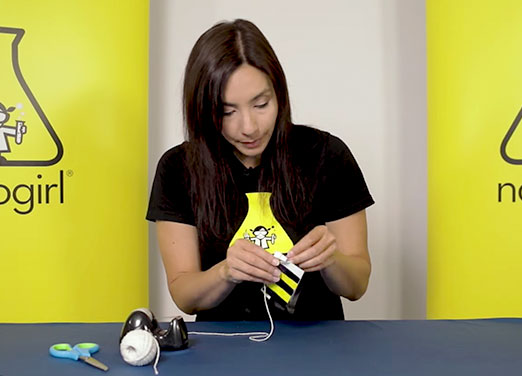
Make your own buzzing bee!
Make this simple toy that really does sound like a buzzing bee.
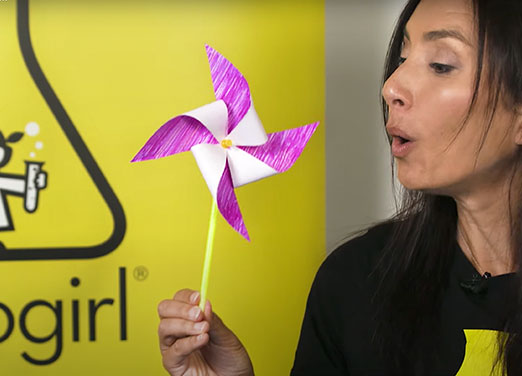
Make a mini windmill
Make and decorate your very own mini windmill.
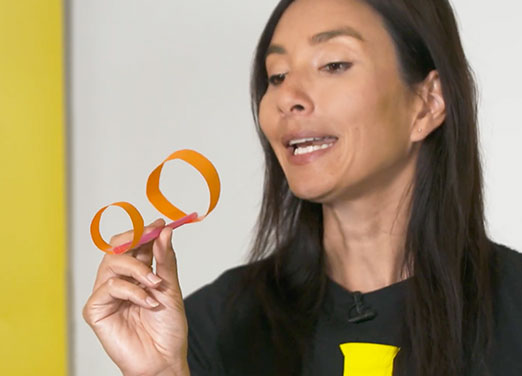
Make your own Hoop Glider
Learn how to make your own Hoop Glider and see how far it can fly!
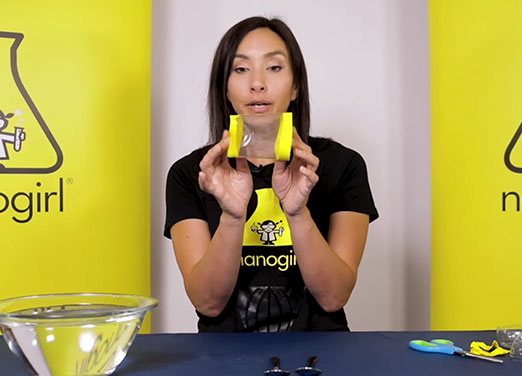
Make your own hydrophone
Learn how to make your own hydrophone to detect underwater sounds!
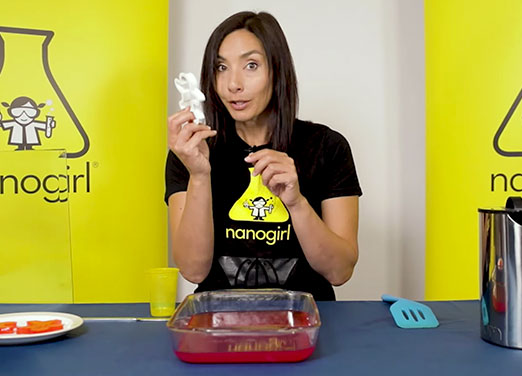
How to make window wobblers
Follow this easy experiment to make your own wobbly window decorations.
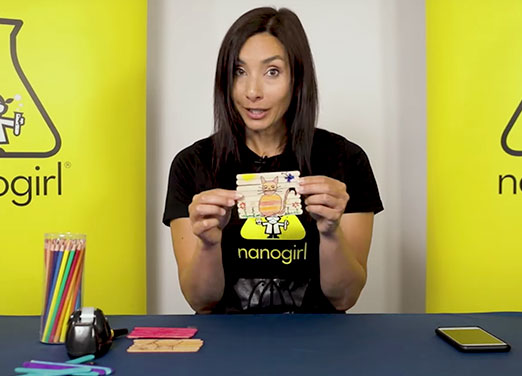
Make your own animal puzzle
Have you ever wondered which animal might be the smartest, and how we might measure intelligence? Make this memory game at home and see how your memory compares to your friends!
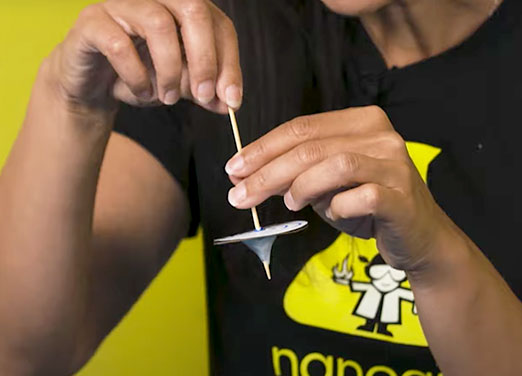
How to make a spinning top
What makes a spinning top keep on spinning without falling over? Hint - it's the same type of force that keeps a spinning black hole turning too!
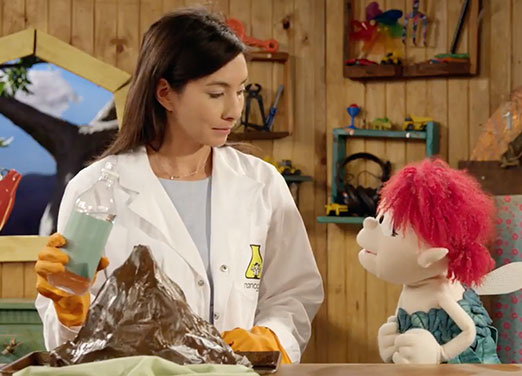
How to make a volcano
Nanogirl and Fern the Fairy make a volcano using the power of baking soda and vinegar on The Moe Show.
Join us for more videos and fun over at Nanogirl’s Lab!
Get on the List
Subscribe to get Nanogirl news, announcements and easy science experiments, straight to your inbox.

IMAGES
COMMENTS
Founded in 2002 by Nobel Laureate Carl Wieman, the PhET Interactive Simulations project at the University of Colorado Boulder creates free interactive math and science simulations. PhET sims are based on extensive education <a {{0}}>research</a> and engage students through an intuitive, game-like environment where students learn through exploration and discovery.
Transform Science Classes with Free Virtual Labs. Our top-notch, ad-free virtual lab simulations are designed to help you achieve just that. Engage your learners with interactive, hands-on experiments that make science education more accessible and enjoyable than ever before. 100% free, forever. Start exploring now!
Science Bob's videos are a combination of experiments you can try yourself and experiences you probably can't replicate. Whether he's building a baking soda volcano or floating through zero gravity with 2000 ping-pong balls, these free science videos are sure to entertain. Check it out: Science Bob. Science Kids
Get science experiments, videos, articles, and more. Make your own Scaredy Sand with sand, water and the magic of hydrophobic spray.
Video lessons made in partnership with the National Science Teachers Association that engage, educate & inspire kids in science. Generation Genius videos are 12-minutes long and include lesson plans, teacher guides, DIY activities and stopping points for class discussion.
Science Table by Anatomage helps you visualize scientific concepts better with 60+ virtual experiments, all with stunningly realistic visuals. From interactive experiments to student-friendly video lessons, you'll be amazed at just how awesome science can be.
#1. PraxiLabs: Best for virtual science lab experiments #2. LearnBrite: Best for VR-ready e-learning experiences #3. LabXchange: Best for customizable science learning #4. Pivot Interactives: Best for real-world science lab videos #5. LabSim: Best for IT certification preparation #6. Mel Science: Best for children's science experiments #7.
Science Experiments & Videos From explosive science to awesome engineering, watch some of Nanogirl's favourite experiments! What are ocean currents? Learn the science of ocean currents with Nanogirl marine biologist, Katey Fish. How to crush a steel drum using air pressure Go behind the scenes of a Nanogirl Live! show to see how this amazing ...
Learn more about science and technology by watching these great science videos. Check out some awesome experiments, animals in the wild, the science of sport, chemistry in action, biology basics, amazing human body processes, nature clips, advanced robots, the latest in technology and much more.
Experiment Videos. Watch a range of fun science experiment videos that show just how exciting science can be. The cool video clips show what happens to marshmallows in a vacuum, how to suck an egg into a bottle, an amazing tea bag rocket in action, how to test how much sugar is in soda and more.